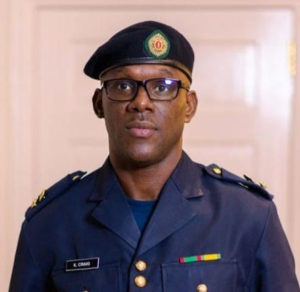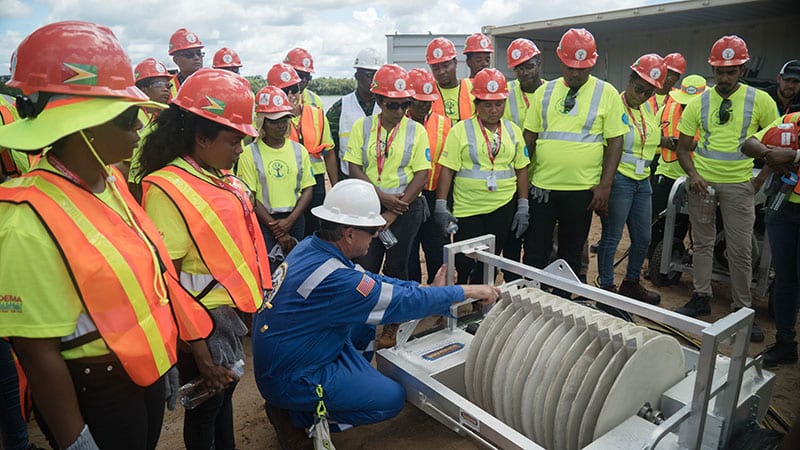With Guyana lacking the capacity to adequately respond to large oil spills–that is, Tier Two and Tier Three spills–local companies have been playing an important role in oil spill response preparedness efforts.
The National Oil Spill Contingency Plan indicates that a Tier Two spill is one that requires a national response offshore, while a Tier Three is one that requires an international response, meaning that it threatens neighbouring countries.
Director General of the Civil Defence Commission (CDC), Lieutenant Colonel Kester Craig is at the helm of the National Oil Spill Contingency Plan Committee, as the Committee falls under the Chairmanship of the CDC.

“When it comes to offshore oil spills where the magnitude can be greater in terms of the quantity of oil spilled, you also have to work in a not so friendly environment in the Atlantic Ocean,” he said.
“We have acquired a number of oil spill response equipment; we have conducted training on the use of some of that equipment and we will be deploying and also distributing equipment to organisations based on their roles and their responsibility. But the equipment that we have is still not adequate,” he admitted.
As such, the Committee has reached out to stakeholders of the oil and gas sector to encourage them to budget for and start acquiring equipment and supplies that will help them to effectively carry out their roles and responsibilities in oil spill response. These stakeholders include oil companies, government ministries and state agencies.
“The equipment that we have alone would not be able to handle that level of spill. What we have started already is to start looking at partnerships whereby there are companies with some capabilities,” Craig added.
GAICO Construction and General Services has invested in marine vessels, skimmers, booms, and other oil spill response equipment, and has trained personnel in responding to spills. The NOSCP Committee has commenced dialogue with that company on their capabilities and what role they can play, as the company has partnered with a European company to build their oil spill capacity, Craig shared. The Committee is also engaging Tiger Rentals, a company out of Trinidad that has a branch in Guyana, on this issue.
“The Civil Defense Commission and by extension the Government see the National Oil Spill Plan as a document that will be used to bring together all the players to effectively and collectively respond to oil spills,” Craig stated. Oil companies, he highlighted, also have resources at hand to help in the response to spills.
“The oil companies, ExxonMobil and others would always have third party arrangements and is also in keeping with their environmental approval out of the Environmental Protection Agency where they have to state where they have additional resources from. There’s no country that will have capacity all the time in place, even developed countries, for a Tier Three spill,” he explained.
It was pointed out that there is a key piece of equipment called a ‘Capping Stack’ that is critical to responding to spills that are caused by well blowouts, and there are only around six worldwide. There are also specialised planes that are used for aerial dispersals. There are international companies that provide oil spill response services that are equipped with these necessary tools, Craig told OilNOW, and these companies’ services can be accessed in the event of a spill.
Nevertheless, he stressed, “It is our intent to work assiduously to work with all our partners, even our local partners and overseas partners, first of all to attain a Tier Three capability.”
In terms of training to build local personnel capacity, this is a continuous effort to ensure that persons are always at their maximum capabilities. According to the Head of the CDC, “The Plan alone is not adequate. We need to train persons and we have trained a number of persons, over 100 persons in terms of technically, in terms of the various ministries and departments that we work with, including our volunteer core, but there has been some amount of community persons that are being trained.”
He recognised that ExxonMobil, operator of the multi-billion-barrel Stabroek block, has been a key partner in training efforts. “The most training that we have achieved, we have received oil spill response training, including equipment deployment, instant command system training which is a key element of coordination of oil spill…most of those training came from ExxonMobil,” he pointed out.
The company is also a key sponsor of the CDC’s Volunteer Emergency Response Team. Within that team, there is a special Oil Spill Response Team which is required to be on standby at all times to help with initial response to an oil spill. “And ExxonMobil would have provided training for that team, so they have been playing a major role in the capacity building of the Civil Defense Commission,” Craig acknowledged.
He said that it is very clear that capacity in the oil and gas sector in Guyana is very limited and the country would have to build those capacities over a period of time. But, in the meantime, they will work with other regional and international organisations for support.



